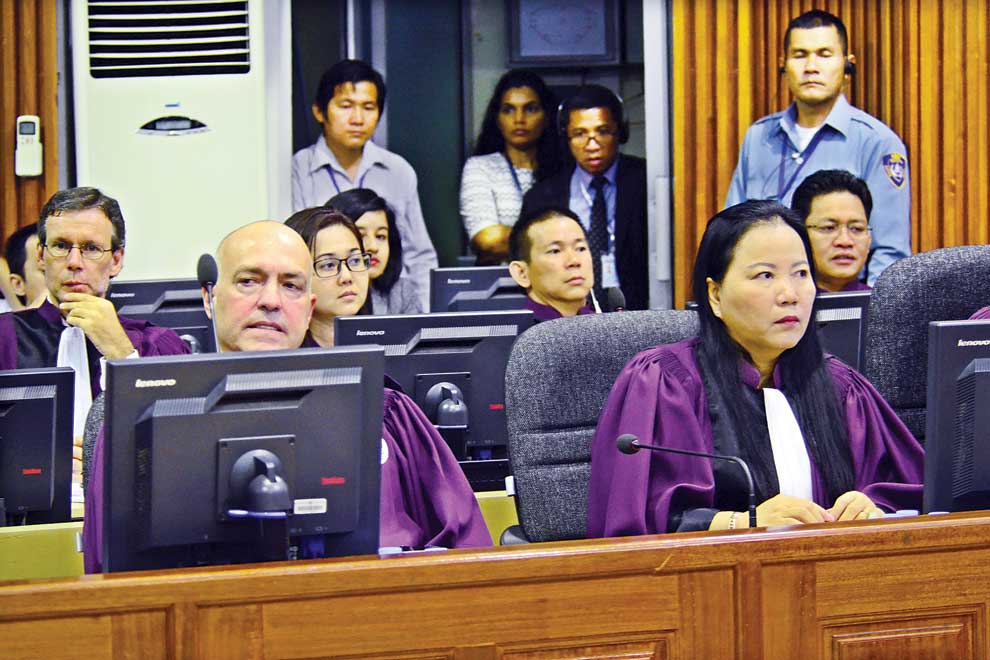
International Co-Prosecutor Nicholas Koumjian (left) and his national counterpart, Chea Leang, differed on whether suspect Ao An should be tried in summaries of submissions yesterday. ECCC
Ao An – the former Khmer Rouge deputy secretary of the regime’s Central Zone – is responsible for genocide, oversaw more than 40,000 deaths and should be sent to trial, the international side of the Khmer Rouge tribunal’s prosecution team has argued, though the national side maintains his case should be thrown out.
The deep rift in the prosecution when it comes to the court’s government-opposed later cases was once again put on display yesterday, as the team released separate summaries of their final submissions to the co-investigating judges in An’s case.
An, who is charged with genocide and other crimes against humanity, is one of four controversial cases before the tribunal. Prime Minister Hun Sen himself warned that “civil war” could break out in Cambodia if An – along with Yim Tith, Im Chaem and former alleged naval commander Meas Muth – were put on trial.
National Co-Prosecutor Chea Leang said that the only “senior leaders” “most responsible” for the crimes of the Democratic Kampuchea regime were “the existing accused” – namely Brother Number Two Nuon Chea and former Head of State Khieu Samphan.
“Ao An, named in case 004/2, is not subject to the personal jurisdiction of the ECCC that needs to be prosecuted,” she said.
International Co-Prosecutor Nicholas Koumjian disagreed, saying An should be indicted and sent to trial. An currently enjoys the presumption of innocence.
“Ao An’s level of responsibility for those crimes is extraordinarily high,” Koumjian said. “[T]he evidence [comprising more than 10,000 documents] demonstrates a direct connection between Ao An and the crimes, including evidence that he personally ordered the killings of thousands, particularly the Cham and other groups targeted by the DK regime.”
He said An convened a meeting and instructed subordinates to “identify all of the Cham in their districts and ‘smash’ them”. The Cham were then “systematically arrested and killed”.
“Unlike other arrested prisoners, the Cham were detained very briefly without interrogation or were executed immediately, indicating that they were killed not because they had committed ‘mistakes’ or were part of ‘traitorous networks’ but merely because they were Cham,” he said.
The case against An zeroes in on the years 1977 and 1979, when he was allegedly deputy secretary of the Central Zone. He was also secretary of Sector 41 – encompassing five districts in Kampong Cham – and at times stepped into an acting role for his superior, Secretary Ke Pauk.
“[T]hese positions of authority placed Ao An in a small group of the most powerful cadres, or ‘senior leaders’ at the top of the Communist Party of Kampuchea [CPK] hierarchy,” he said.
“Ao An also received instructions directly from Ke Pauk and Ta Mok, demonstrating his close links to the highest levels of the CPK and the trust that the top Khmer Rouge leaders had in him.”
The purge in Sector 41 that claimed the lives of thousands of men, women and children “functioned as a single system, requiring coordinated action organised by the sector and zone leadership. At the heart of this system was Ao An”, Koumjian said.
He went on to list eight sites under An’s authority where mass graves and thousands of corpses were found, including Wat Au Trakuon Security Centre in Kang Meas district, which Koumjian characterised as “one of the deadliest prisons” of the regime, with more than 20,000 people estimated as being killed there.
An and his subordinates also “committed the crime of rape” by enforcing marriage and consummation in a “pervasively coercive environment” that led the couples “to have intercourse without the true consent of either the women or the men involved”, he added.
Ao An’s defence team declined to comment on the prosecution’s stances.
Court observer Long Panhavuth said it was “not surprising” the two sides of the prosecution were at odds, and said it was too early to tell if An’s case would follow the same route as Im Chaem’s.
The case against the former alleged district secretary was dismissed by co-investigating judges in February, as she was deemed too lowly for the tribunal’s jurisdiction, although Koumjian has signalled he will appeal that decision.
“There is a problem of transparency; it is very difficult to view and observe whether Ao An is similar,” Panhavuth said, questioning whether the co-investigating judges would be transparent about any “disagreement” they had.
The co-investigating judges recently lashed out at journalists and leakers after The Post revealed they were considering closing the remaining cases, saying any future breach of confidentiality would be taken to the Cambodian courts.
“If transparency continues to be an issue like today, I would say the battle is lost all the time,” Panhavuth said.
Contact PhnomPenh Post for full article
Post Media Co LtdThe Elements Condominium, Level 7
Hun Sen Boulevard
Phum Tuol Roka III
Sangkat Chak Angre Krom, Khan Meanchey
12353 Phnom Penh
Cambodia
Telegram: 092 555 741
Email: [email protected]




.jpg)










